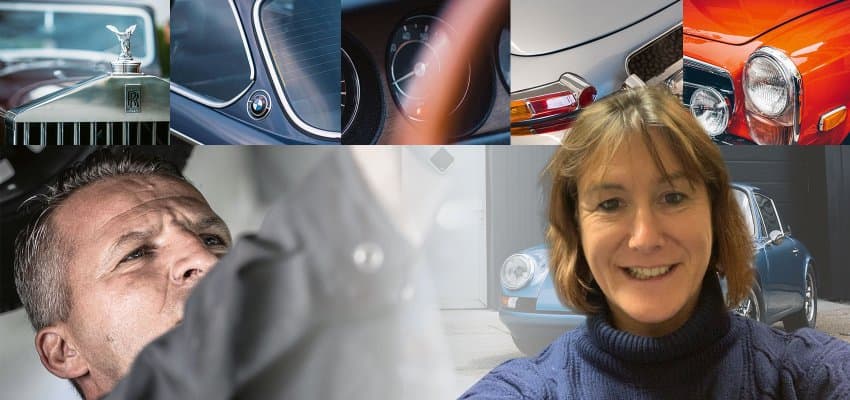When a long-standing customer, renowned for the quality of their restoration projects, needed to achieve the best possible paint finish from their existing compressor, an enthusiastic Mark responded to the challenge.
The business specialises in restoring classic cars in the Cambridgeshire area
Set up by two brothers, the business has developed a reputation for restoring the usual British and European brands of heritage cars. Their experienced team and extensively equipped workshop, including body shop and spray booth, can deliver everything from basic maintenance to a complete ‘nuts and bolts’ bare metal restoration.
Cambs unique experience in supplying the highest quality of compressed air
The brothers have been longstanding clients and as with many other customers in the heritage restoration business, have a real passion for their work. They wanted to explore if they could improve their air supply to get even better results. Cambs Compressors are one of the UK's best when it comes to air filtration, we've invented systems for medical use and often create bespoke filtration solutions for specialist industrial applications. We’re also experienced in this sector, looking after several restorers of heritage transport, ranging from Spitfires and Lancaster bombers, to specialist military and classic vehicles.
Understanding how the quality of compressed air impacts the results
The restoration and re-engineering of old classic cars is a highly specialised business, it involves exceptional craftsmanship, expertise, and a great deal of time. The preparation is fundamental to the process, just as the quality of compressed air is critical to spray paint finish. The supply of high quality, clean compressed air for this process is essential, and after reviewing some diagnostics we identified ways in which we could significantly improve the supply quality. With a bespoke filtration solution, utilising standard products, the system modification is both cost effective to run and maintain. To the untrained eye the difference in the ‘before and after’ paint finish is marginal, but to the critical eye of the brothers it takes their spraying quality to another level.
Why the quality of compressed air is so important in classic car restoration
In classic car restoration, achieving a high-quality spray paint finish is crucial for maintaining the authenticity and aesthetic appeal of the vehicle. The quality of compressed air supply can have a significant impact on the final spray paint finish.
The application of compressed air and its importance within the highly specialised and skilled process of restoring and re-engineering such a prestigious end-product, is an excellent example of Cambs Compressors ability to respond to a wide range of challenging situations.
To achieve the best possible spray paint finish in classic car restoration, it's recommended to invest in a high-quality compressed air system that includes moisture separators, filters, regulators and other necessary components. Regular maintenance and testing of the compressed air supply are essential, to ensure consistent and optimal results for your paint application.
Here's what a compressed air filtration system will solve:
Moisture Content: Compressed air can often contain moisture, which can adversely affect the paint finish. Water droplets mixed with the paint can lead to uneven application, splotches, and poor adhesion. It can also cause rusting or corrosion under the paint over time. Using a compressed air system with proper moisture removal and filtration helps minimise this issue.
Oil and Contaminants: Some compressed air systems might introduce oil or other contaminants into the air stream. These particles can mix with the paint and result in a rough or uneven surface, affecting the overall finish quality. Installing effective filtration and ensuring proper maintenance of the air supply system can prevent such issues.
Pressure Consistency: Consistent air pressure is essential for achieving an even and smooth paint application. Fluctuations in air pressure can lead to inconsistent spray patterns, overspray or underspray. High-quality compressed air regulators and pressure control mechanisms are necessary to maintain a stable and uniform pressure throughout the spraying process.
Particle Size and Distribution: The quality of the compressed air can impact the atomisation of the paint particles. Properly atomised paint particles create a finer mist that results in a smoother finish. If the compressed air supply is not clean or consistent, it can lead to larger paint droplets, resulting in a textured or orange-peel appearance on the painted surface.
Airborne Particles: Dust, dirt, or other particles present in the compressed air can become embedded in the wet paint and mar the finish. A high-quality air filtration system helps reduce the risk of foreign particles affecting the final paint surface.
Drying Time and Adhesion: Moisture or contaminants in the compressed air can prolong the drying time of the paint or interfere with its adhesion to the surface. This can result in paint defects, such as runs, drips, or sagging. Proper air quality can help ensure that the paint cures correctly and adheres well to the substrate.
To achieve the best possible spray paint finish in classic car restoration, it's essential to invest in a high-quality compressed air filtration system that includes moisture separators, regulators, and other necessary components. Regular maintenance and testing of the compressed air supply are essential to ensure consistent and optimal results for your paint application.
Cambs Compressors can help you every step of the way!



